‘I never knew that ……’
Liverpool Hope University 1st October 2016.
The use of round tables in the Eden Arbour Room at Liverpool Hope University facilitated a welcome and a warmth to the buzz of conversation as participants in the Balfour Project conference gathered to consider the ‘Balfour Declaration Centenary, 2017: towards constructive commemoration.’
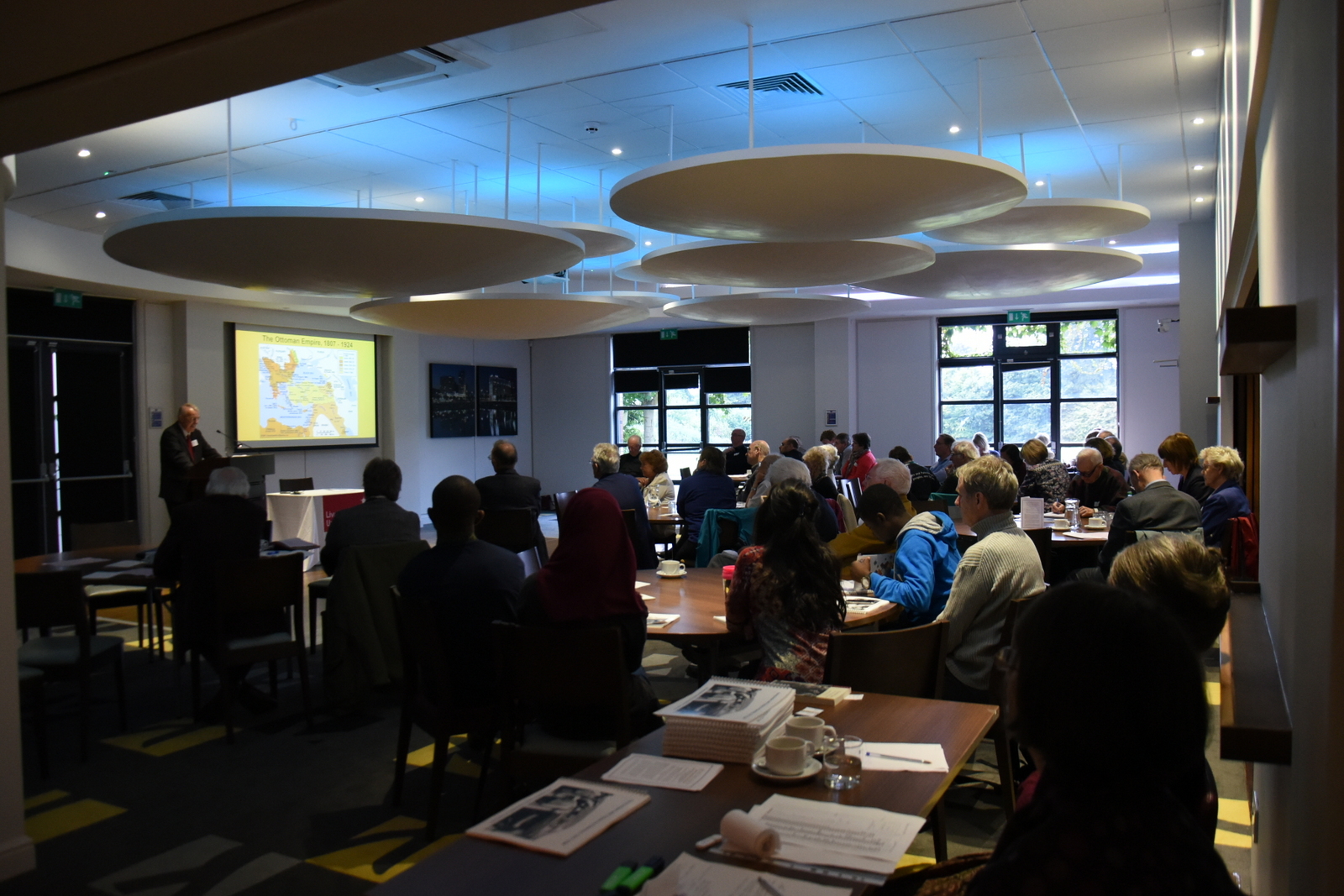 We came as individuals, and as representatives of many organisations, each concerned to use every opportunity to bring a resolution to the current conflict in Israel/Palestine.
We came as individuals, and as representatives of many organisations, each concerned to use every opportunity to bring a resolution to the current conflict in Israel/Palestine.
As well as considering ‘How’ to mark this particular centenary, the question of ‘Why’ should be asked. Will looking at history of 100 years ago help resolve the acute injustices of the present time?
The day was chaired engagingly by the Very Reverend Nicholas Frayling, who had served in Liverpool and the Cathedral for 15 years before becoming Dean of Chichester.
The film ‘Britain in Palestine 1917-1948’ was shown to considerable acclaim, and appreciation of its balance. Recommendations were made that we should all be ambassadors in promoting its use widely in different faith groups, and in schools – where ‘there is a black hole in British education on this topic.’ A student from Nigeria widened the discussion by asking Britain, and other former colonial nations, to a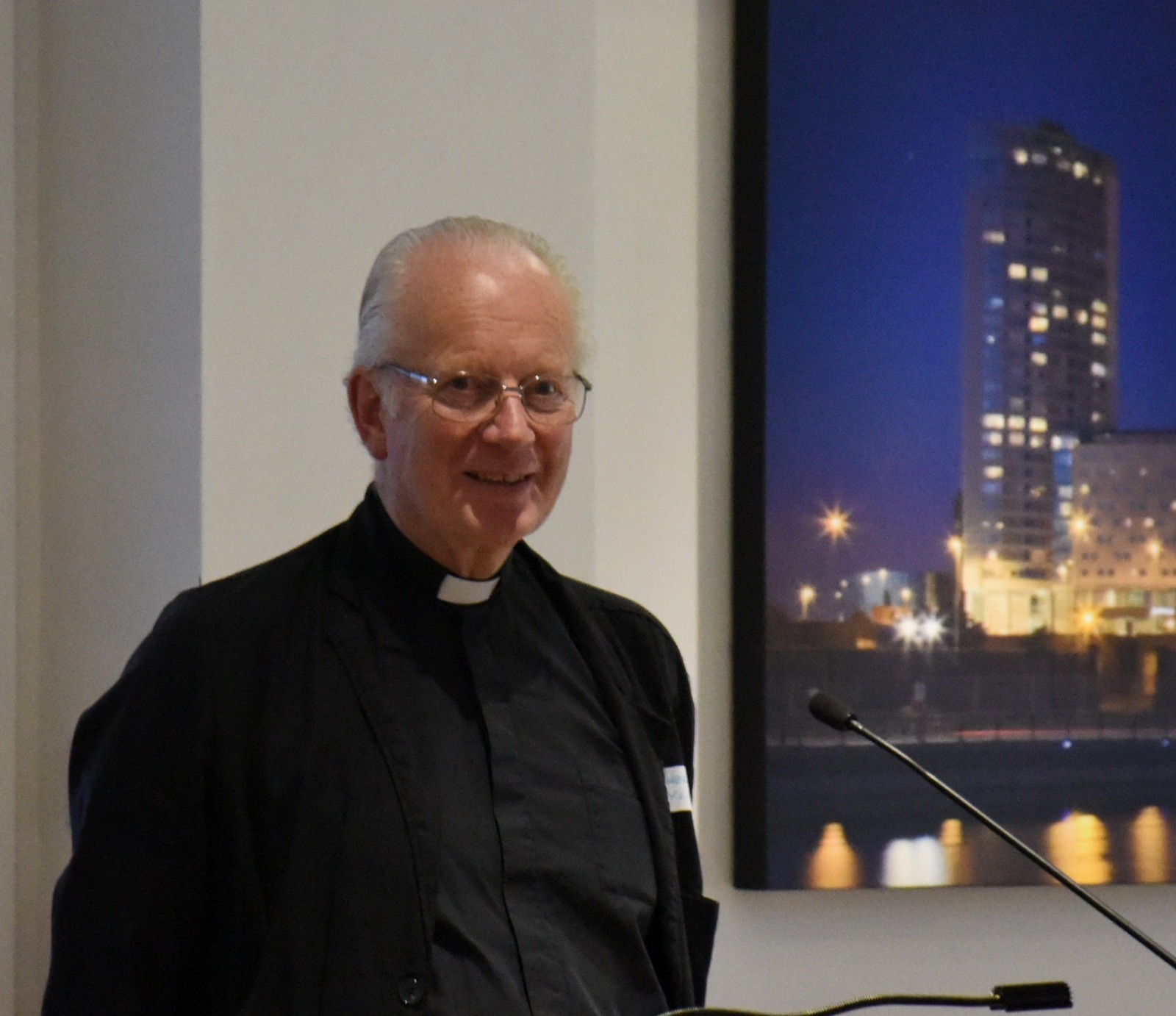 cknowledge the past in order to redirect the future. Otherwise, as the Chairman said, we will have to face the pain of unhealed history. The deputy Director of the Desmond Tutu Centre for War and Peace Studies also appreciated the ‘very balanced documentary’, and he reminded us that, despite the complexities around WW1, none of this conflict would have happened if it were not for the centuries of discrimination and oppression suffered by the Jewish communities of Europe. Another reminder was of Britain’s clear responsibility for introducing measures to control populations that continue today, like house demolitions, and administrative detention.
cknowledge the past in order to redirect the future. Otherwise, as the Chairman said, we will have to face the pain of unhealed history. The deputy Director of the Desmond Tutu Centre for War and Peace Studies also appreciated the ‘very balanced documentary’, and he reminded us that, despite the complexities around WW1, none of this conflict would have happened if it were not for the centuries of discrimination and oppression suffered by the Jewish communities of Europe. Another reminder was of Britain’s clear responsibility for introducing measures to control populations that continue today, like house demolitions, and administrative detention.
Dr Peter Shambrook’s keynote address on Palestine and Britain 1917-1948: Competing Policies, Competing Narratives, Creative Commemoration.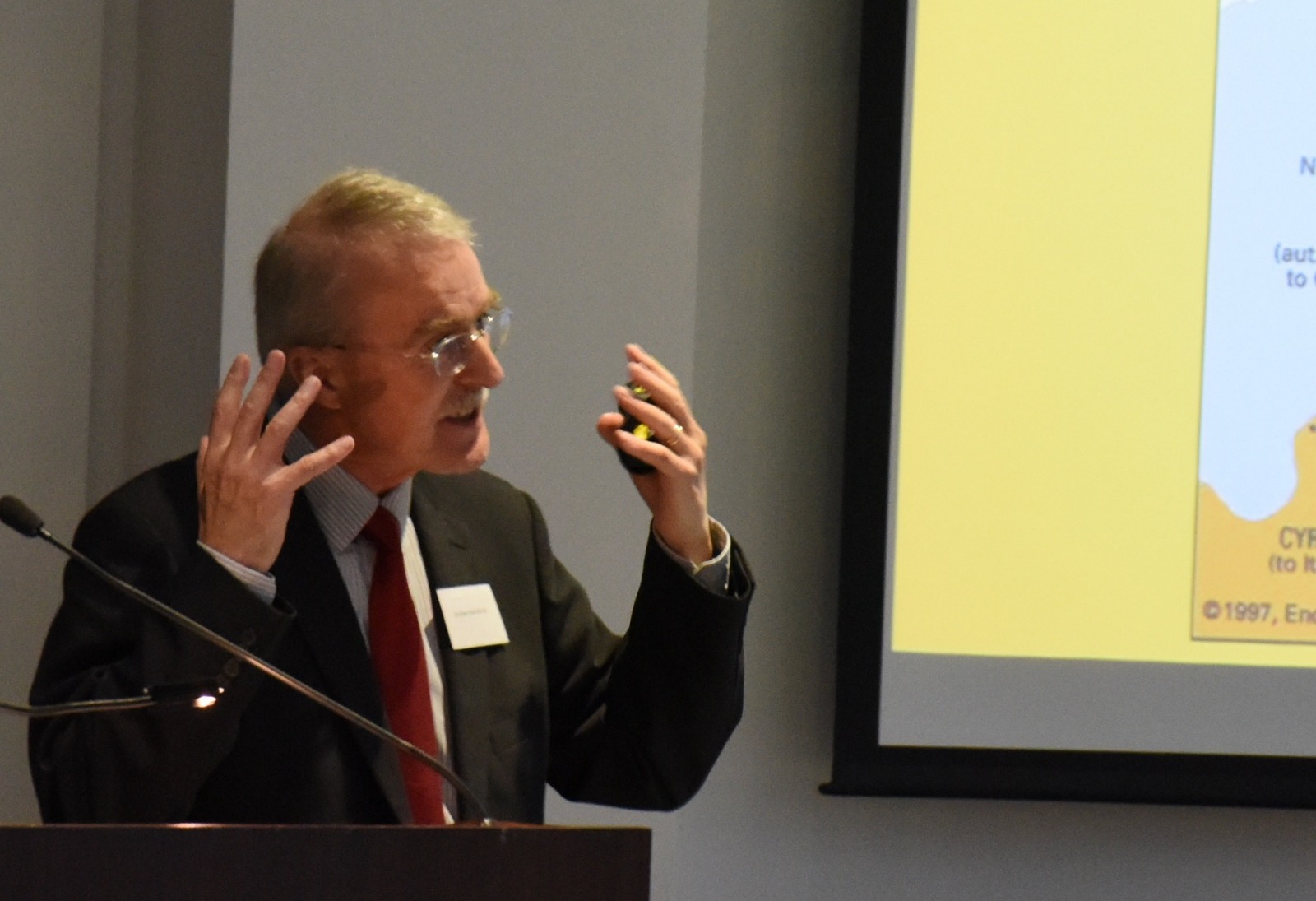
(The address will be available on the project website – in due course.)
He started with the Dardanelles campaign and how the total disaster of Gallipoli led to Britain’s offer of an independent Arab state to Sherif Hussein. This was followed by the negotiations with the French and Russians, leading to the secret Sykes Picot agreement, which went back on the offer to Hussein. Then in 1917 came the Balfour Declaration.
For Jews generally and for the State of Israel, it’s the foundational charter – a morally valid gift of potential salvation, for a persecuted, scattered nation-in-exile, from a civilised Great Power; for the Palestinians, it was a bill of sale, an immoral and racist Great Power subterfuge which led directly to the loss of their country to Jewish intruders. ‘
A major characteristic of Zionist writing is the almost complete absence of Palestinian society
Shambrook’s last section dealt with the war of 1948, how at least 250,000 Palestinians were expelled by the Yishuv in the 3 months before the British left. After May 1948 Arab armies invaded with domestic agendas and without any unified plan. They were routed by the Zionists.
The Zionist story was that the infant Jewish state, with fewer forces, and initially fewer armaments, fought a desperate, heroic battle for survival – and won.
From the late 1980’s some Israeli historians revised this Zionist narrative on the war. They also claimed that far from Britain trying to prevent a Jewish state, we prevented the formation of a Palestinian state.
Shambrook then looked at various examples where countries have acknowledged past policies. Willie Brandt kneeling in front of the Warsaw Ghetto in 1971, which was a turning point in German-Polish relations. The bicentenary of the slave trade in 2007, which he considered as a lost opportunity as there was no mention of British responsibility. The third was Her Majesty the Queen’s visit to Dublin in 2011. ‘The significance of her gestures and her words during that visit were deeply moving, and have to be measured in the light of the 700 year turbulent history between the British crown and Ireland. Her visit was a vivid demonstration that commemoration, including both celebration and acknowledgement is both hope-giving and creative – and that acknowledgement, in particular, is a sign of civilisation, not a sign of weakness.’
‘The centenary of the Balfour Declaration in November 2017, will’ he hoped, ‘be marked appropriately, acknowledging both the Zionist and Palestinian national narratives, and when the origins of the Declaration, the Declaration itself, and its multiple consequences will be commemorated by the British government in a transparent and forward-looking fashion. It will require extraordinary leadership – in fact a dimension of statesmanship beyond all domestic party political considerations, and beyond the fears of Foreign Office lawyers. The second of November 2017 is an opportunity not to be missed.’
Judah Passow is a renowned photographer from London and is preparing the presentation ‘Promised Lands’, in the plural, he says, because this is land promised twice to two different peoples. ‘The project looks at life today, at what the Balfour Declaration euphemistically refers to as the existing non-Jewish community – the Palestinian citizens of Israel.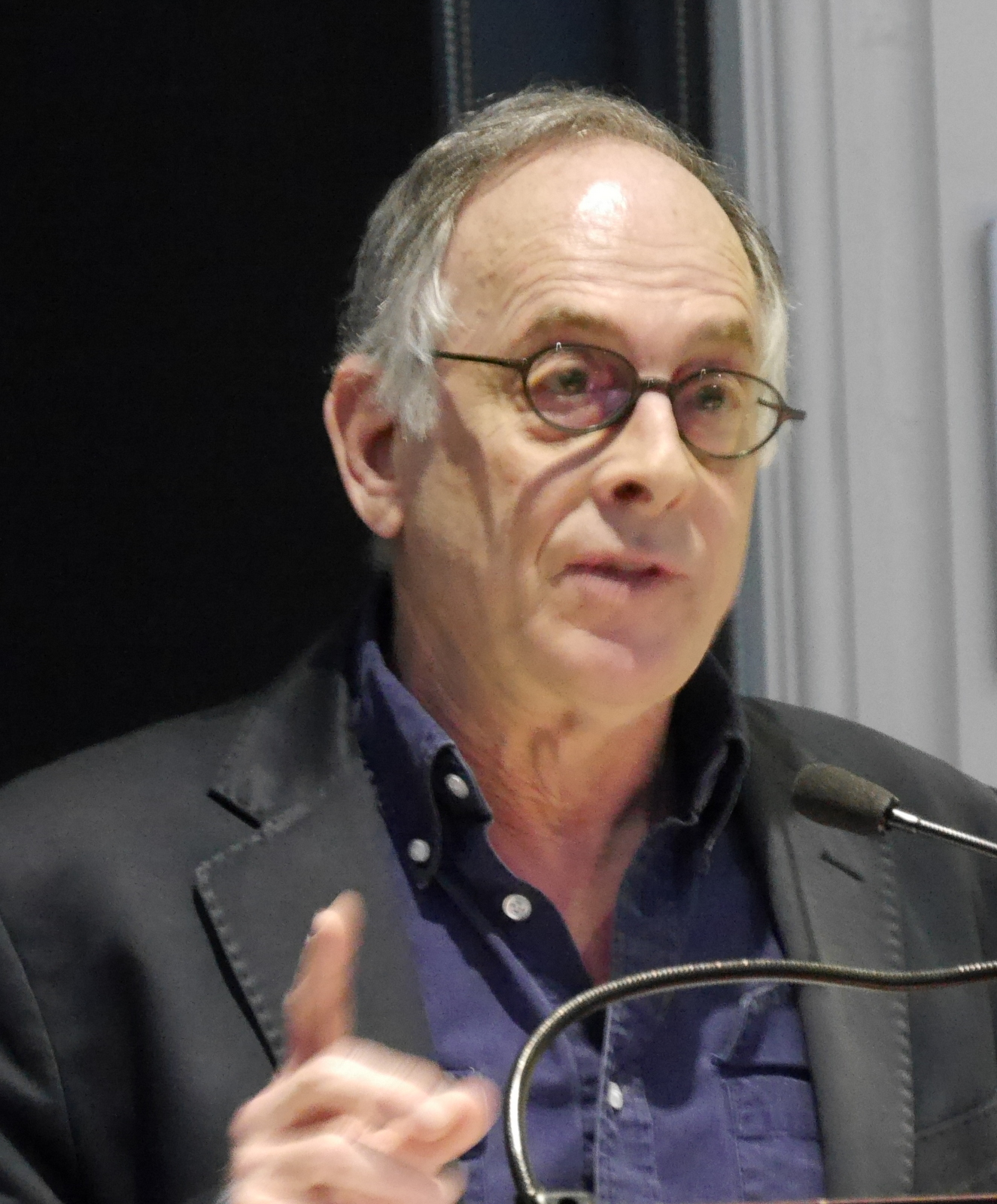
Designed to be completed in 2017 to mark the 100th anniversary of the Balfour Declaration, this project will produce a set of photographs which examine that gap between the promise made by the new state to its Palestinian citizens and what, in fact, has been delivered in the last six and a half decades. The photographs produced by this project will ask several fundamental questions about Palestinian Israeli perceptions of identity: How do you express your relationship to your tradition and culture? How do you express your relationship to a place? What do you have to surrender to belong? Can you belong without surrender?’
Judah Passow’s talk. was greatly appreciated and sparked much discussion, including a comment that these questions are relevant not only to Israel Palestine, but to all who like immigrants are seeking their ‘promised land’ with security, dignity and human rights.
John Bond, OAM, former Secretary of the Australian Journey of Healing: addressed the question of How could civil society mark the centenary of the Balfour Declaration?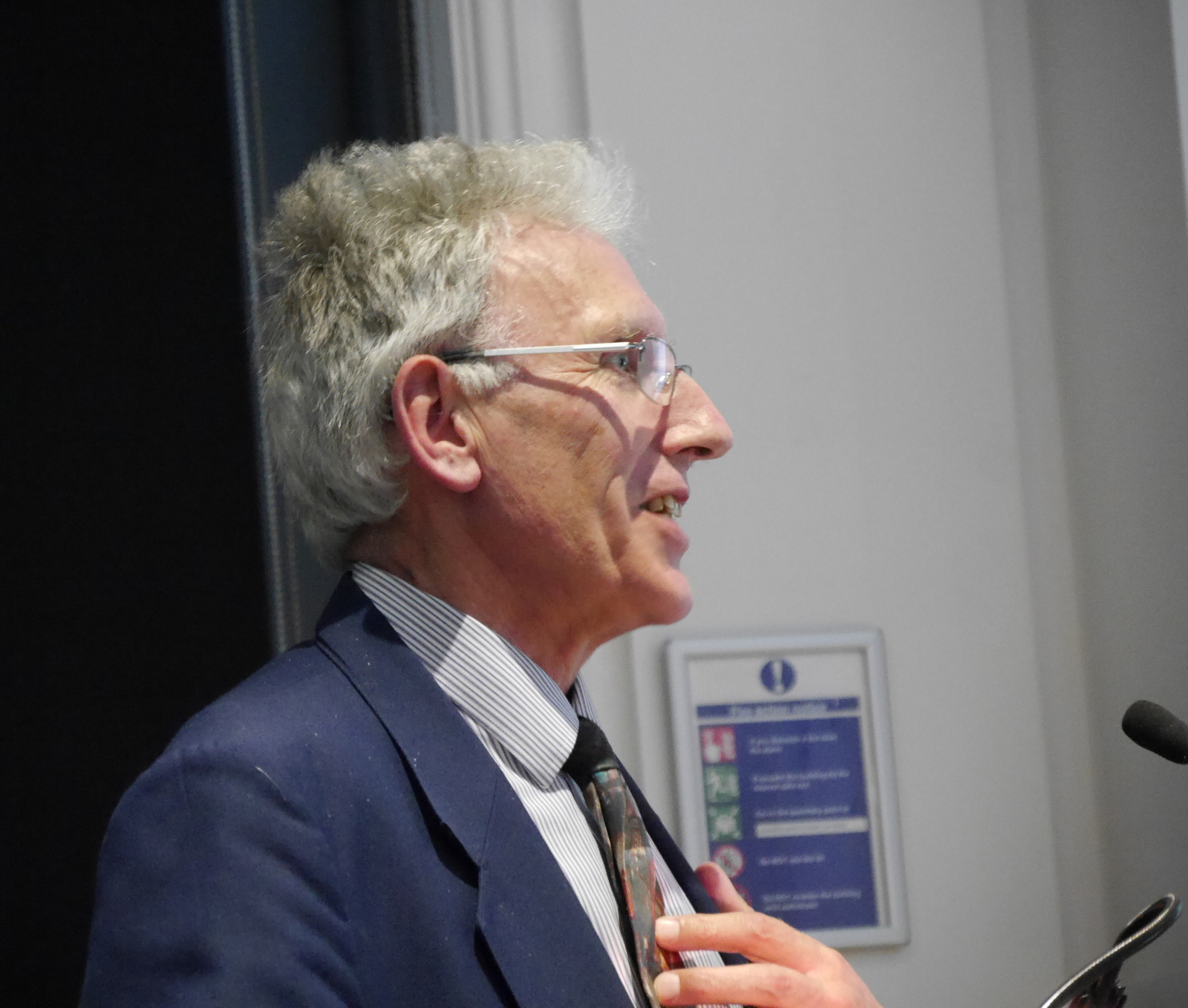
The Journey of Healing was the response of the Australian community to the revelations of a report published in 1997 detailing the tragic impact of policies, implemented through most of the twentieth century, which removed Aboriginal children from their families in order to assimilate them into white Australian culture.
It began with a Sorry Day in 1998 in which nearly a million Australians took part. Many of these people then took part in a Journey of Healing through the next ten years, which not only did much towards healing among Aboriginal people who had suffered from the policies, but also changed political attitudes. Whereas the Australian Government had refused to apologise for the policies when the report was published, by 2008 when Kevin Rudd was elected Prime Minister, attitudes in Parliament had changed so much that Rudd made this apology with the support of the whole Parliament. As Rudd said later, ‘Politicians are notoriously slow. The groundwork for the high symbolism of a national apology was done by those who organised committees for Sorry Day and the Journey of Healing when political obstacles seemed insurmountable.’
John recounted, ‘It took us 10 years of work to reach the point where an Australian Prime Minister made a wholehearted apology for the cruel and misguided past policies. It may take a long time before a British Prime Minister acknowledges the wrongs done to the Arab peoples through misguided British policies. But the struggle is worth it, because only then will we shape policies which win the respect of those we have wronged. The centenary of the Balfour Declaration is a significant staging post on the way to this goal.
‘I believe this experience contains lessons for those who want to help to heal the harm caused by British policy in Israel and Palestine. Whatever settlement is worked out between Israel and Palestine is primarily their business, and I have no doubt that in both countries there are people with creative solutions. Where we can help is in creating the climate in which negotiation has a possibility of success.’
The chairman said this was a fine example of people power from Australia. Discussion then ensued on how to enable people in Britain to engage with the problems of the Middle East, and how to involve the media. What had been the effect on Aboriginal people, one person asked? John said that the recognition of this history has done much to bridge the gulf between Aboriginal Australians and the wider Australian community. As an example, he told of an Aboriginal musician who found the strength to break with alcoholism, because he felt that for the first time white Australians had recognised the harm caused to him and others. Today people of all races love his music.
For a fuller account, and an extract of the video of the Australian experience, see: The Struggle for Truth, Healing and Justice: some creative examples by John Bond.
Discussion with the panel, comprising Elizabeth Harrris, Christine Elliot, Peter Shambrook, Judah Passow, John Bond and Roger Spooner.
Elizabeth Harris, former Associate Professor in the Department of Theology, Philosophy and Religious Studies at LHU and Research Fellow in Birmingham, has a particular interest in conflicts where religion is not innocent. She felt that not to mark this centenary would be as much a political statement as to mark it, and would be widely misinterpreted. So marking it may be a necessary risk. And she endorsed that acknowledgement is a sign of maturity not of weakness.
Christine Elliot is Director of International programmes for Churches Together in Britain and Ireland (CTBI). There are very different views and expectations amongst the 41 member churches in regard to the Middle East, and the Balfour Project might well be of help in addressing these. We are re-envisioning the future – what do we expect from that, what are we asking of ourselves, and what do we want to see change?
Questions addressed to the panel asked where do we go from today? Are Parliamentarians still searching for the most appropriate way to commemorate? All communities that have been impacted by the Balfour Declaration should have a voice, and their stories heard. And Britain must with unflinching honesty recognise the unfinished business and resolve the continuing responsibility for the plight of the Palestinians. Can we focus on the parts of the Balfour Declaration that are unfinished and would help to bring justice and peace to Israelis and Palestinians together? An urgent task is to co-ordinate action of the various independent and interested groups, also to bring members of the public to know and to care what Britain did and did not do. Could there be vigils all over the UK to remember all who have suffered from WW1 – to demonstrate transparency, healing, reconciliation, silence? Yazid Said, a new member of staff at LHU, is a Palestinian Christian and an Israeli citizen. ‘There is a need to acknowledge failures that came out of the Balfour Declaration, but historic circumstances of the times meant strong support for a Jewish homeland, despite the disastrous implications afterwards.‘ He commended the groups of Palestinians and Israelis who show humanity by listening to each other and say ‘My pain is like your pain.’
Crucially, what language could express sorrow that the Declaration failed to create the security for the Jewish people and protection for the rights of the Palestinians, that its authors claimed it would?
How relevant is the Balfour Project, when the main influence on Israel now is not Britain but the US? We must still do what we can do, and the churches, the ‘soul of our country’, must speak truth to power about the past and the present. How can we best stay in communication now? Connectedness is up to us. We can use the Project web site and the film which is freely available on it, and social media. Desmond Tutu was quoted, ‘If you think you are too insignificant to do anything, you’ve never been in bed with a mosquito!’
The discussion was rich and varied and very valuable. Everyone received a copy of the Companion Guide to the film, a precious resource with many references to the original documents.
In his concluding remarks the chairman, Nicholas Frayling, said that after seeing the film ‘Britain in Palestine 1917-1948’ many people ask ‘Why did I not know that?’ So the educational role of the Balfour Project is vital, and we try to be even-handed in our approach, hard as that is. He said that ‘the Balfour Declaration was born of controversy, it contained conflicting promises and has led inescapably to conflict.’ He appreciated the late John Austin Baker, Chaplain to the Speaker of the House of Commons, Rector at St Margaret’s Westminster, and Bishop of Salisbury, who when speaking about Ireland said, ‘Politics and peace processes, even when carried out with the best of intentions, can take us so far and no further. True lasting reconciliation depends that we tread the more costly road of sorrow and repentance.’ Although repentance is a religious notion, it has very worldly and practical application, of which John Bond’s experience is a profound illustration. Nicholas referred to the joyful announcement by a Col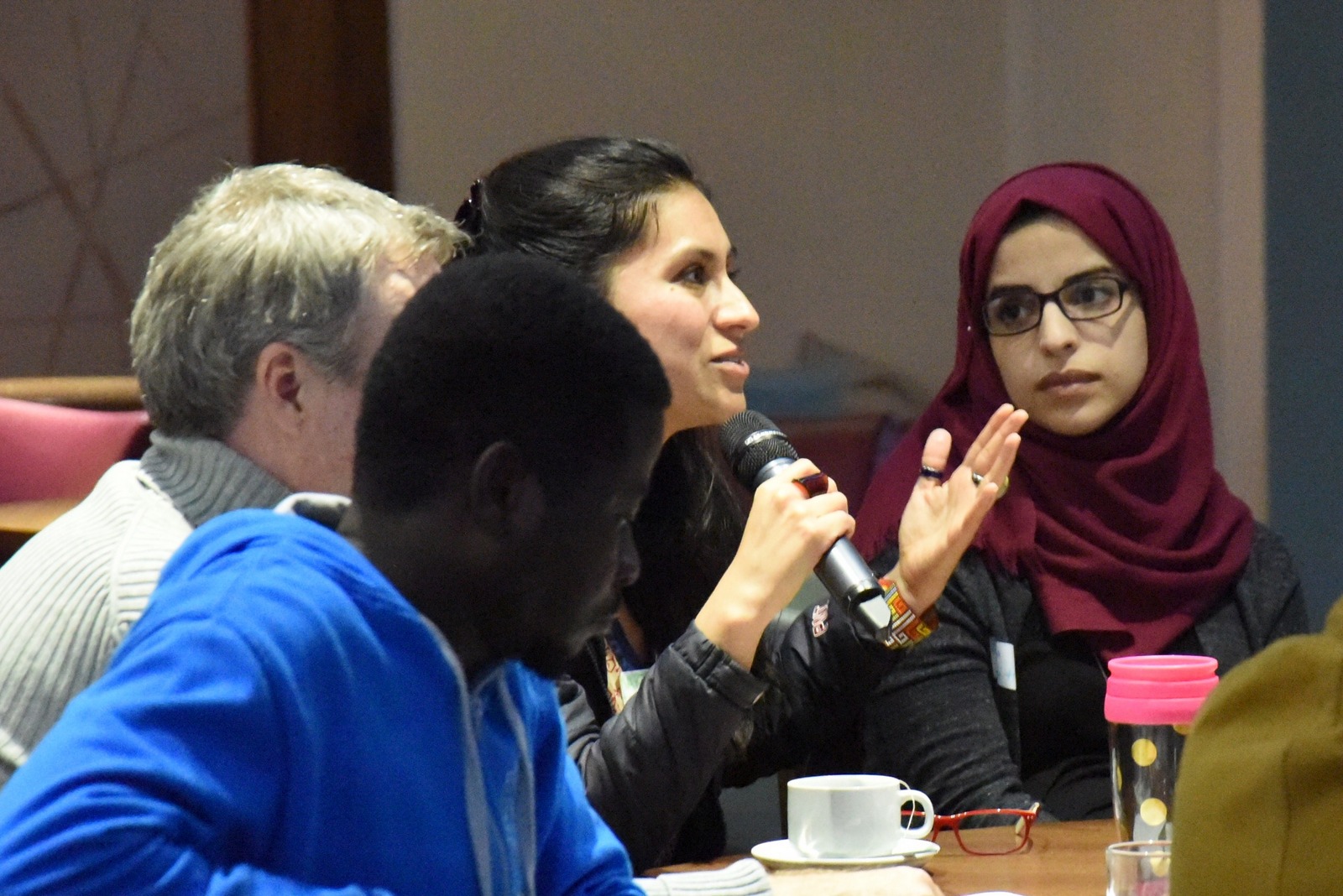 umbian student of the peace agreement signed recently between the government and FARC. And he quoted the Palestinian theologian Cannon Naim Ateek, ‘The only way to peace is through the door of justice.’ The Balfour Project believes that in relation to the Holy Land that means justice for all the peoples of the land.
umbian student of the peace agreement signed recently between the government and FARC. And he quoted the Palestinian theologian Cannon Naim Ateek, ‘The only way to peace is through the door of justice.’ The Balfour Project believes that in relation to the Holy Land that means justice for all the peoples of the land.
The Balfour Project is trying to address history with courage and with purpose, and to use the Balfour centenary to help find a fair solution. Shimon Peres was quoted, ‘Israel faces eternal war if there is no Palestinian state. We have got to hand back the territories …. It is better to negotiate for peace in pain and frustration for years than to have five minutes of gun fire and bullets.’ These are remarkable and courageous words, as are those of Ian Paisley when he met with Martin McGuiness on the site of the Battle of the Boyne, saying ‘It is time we looked at our shared history.’
Profound thanks were expressed to Liverpool Hope University, to the staff who helped make it such a memorable day, and in particular to Vice Chancellor Professor Gerald Pillay for trusting us to use his rooms constructively.
